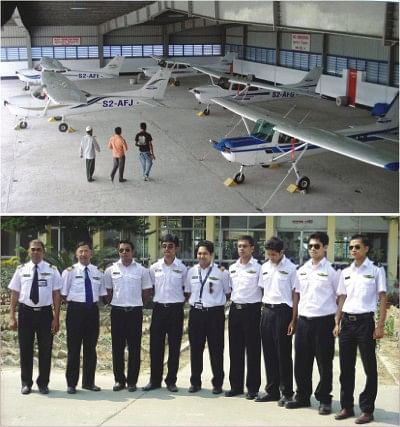For the love of flight

Top-Bottom: Galaxy Flying Academy Ltd has built a huge hangar to accommodate five of its training aircraft at Shah Makhdum Airport in Rajshahi.
Some trainees pose with Galaxy officials for a photograph.Photo: STAR
Maruf Islam Priam, 17, dreamt of becoming a pilot ever since he was a student of class three at Rajshahi Collegiate School. He was determined to pursue a career as a commercial aviator by 2008 when he passed his HSC from Rajshahi City College.
Looking frantically for a suitable flying academy at home and abroad, Priam and his parents came to know about Galaxy Flying Academy Ltd (GFAL). It operated from Shah Makhdum Airport, which is 5 kilometres from Rajshahi city and 275 kilometres from Dhaka.
“I felt unusually excited when I heard about Galaxy. I rushed to the airport to check it out. My parents readily agreed.”
Priam, son of a merchant Shahinul Islam of Rajshahi city, is now enrolled as one of the 18 students at GFAL. “The training expenses that need to be paid in instalments are quite affordable. Moreover, my son will live close to me,” said Priam's father.
Sheikh Salman Hoque Raphael from Khulna and MM Ismail Jackey from Dhaka were also enrolled at GFAL, but for reasons different from Priam.
Raphael was about to go to the Philippines when he found GFAL. He was denied admission at an American flying academy because he was Muslim.
He was persuaded to join because of GFAL's experienced foreign trainers, well-designed syllabus, a minimum of 18 months of learning period and a large number of training aircraft.
“Galaxy has all the required facilities. I was thrilled to pieces to have my first experience of flying.”
Jackey found the GFAL training cost of Tk 27.5 lakh to be more affordable than that charged by other academies at home or abroad.
He said it would cost him over Tk 70 lakh in America and Tk 40 lakh in the Philippines. “I found a better opportunity in my own country.”
All three student-pilots hope they would get jobs with commercial airlines upon completion of the GFAL training successfully. Their training began on December 18.
Although all of GFAL's students are now locals, academy officials hope they would be able to attract students from the Middle East, East Asia, Africa and neighbouring Saarc countries in the coming year.
Students from Nepal, Malaysia and China have initiated the process of enrolling with GFAL. The academy expects business worth around Tk 30 crore a year from the two initial courses.
GFAL offers two courses as per rules and regulations of the Civil Aviation Authority of Bangladesh (CAAB). It prepares students for written examinations, flying and medical tests by CAAB for Private Pilot's License (PPL) and Commercial Pilot's License (CPL) courses.
A student training to obtain the PPL has to pay Tk 9.75 lakh in fees in 7 to 8 months and Tk 17.75 lakh in 11 to 12 months for the CPL course.
Masudur Rahman, a Bangladeshi expatriate in Canada, established GFAL in early 2009. He expanded eventually to Shah Makhdum Airport in Rajshahi as the airport was lying inoperative since 2007.
The airport has a runway that is 6000 feet long and 100 feet wide and offers excellent conditions for training, said GFAL officials.
They constructed a spacious hangar taking on lease a portion of the airport, which can accommodate five to seven aircraft along with necessary maintenance facilities and an operations centre.
GFAL procured five training aircraft -- one Cessna-152 and four Cessna-172R -- and developed other facilities at the airport. It rented a modern 6-storied hostel building at Rajshahi for the student-pilots.
The academy, however, conducts all ground classes at its head office in Dhaka for strategic reasons.
Being the first residential flying academy in Bangladesh, GFAL aims to produce pilots with outstanding professional qualities as the trainees live a disciplined and regulated life at the academy.
Pilots are now in great demand worldwide following rapid expansion of air transport and restrictions imposed on Muslim student-pilots training in western countries, said Rahman, managing director of GFAL.
Quoting expert opinions, he said at least 200,000 new pilots will be needed globally in the next two decades as the airline industries are growing at about five to eight percent a year.
International Civil Aviation Organisation (ICAO) had to increase the retiring age for pilots to 65 years from 60 years to meet the acute shortage of pilots. “But this measure alone will not be adequate, unless training facilities are increased,” he said, citing a warning by International Air Transport Association's (IATA) for severe pilot shortages.
The number of airlines in Bangladesh has increased to 14 from just one in the last few years. Many of them are now expanding while about 125 companies have obtained licences to establish new airlines.
GAFL could not find any Bangladeshi flight instructor for employment and so was forced to hire flight instructors from Europe, the managing director said.
GFAL's acting chief flight instructor Guillermo Garcia, a Spanish expert, believes Bangladesh has potential.
He joined GFAL after stumbling upon a job offer on the internet. “I thought it would be a good opportunity as the aviation business of this country needs to grow and it is growing. New airlines are coming to the market and the demand for pilots is growing everyday.”
In his four years of experience as a trainer, Garcia mostly got Chinese students. He said, “Bangladeshi students are determined and flying is a vocation for them. They all are willing to fly because they love flying.”
“As for the Chinese, they have job openings and they took the chance. It's not that all of them enjoy flying.”
GFAL also has schemes to facilitate Bangladeshi students with scholarships and bank loans.

 For all latest news, follow The Daily Star's Google News channel.
For all latest news, follow The Daily Star's Google News channel. 



Comments